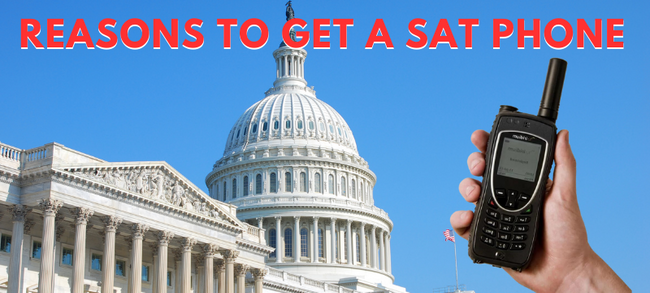May 29, 2023

Breaking News: The US Senators are Getting Satellite Phones for Security, and You Should Too
In an increasingly connected world, it's hard to imagine being out of touch. Yet, there are situations and places where traditional cell phone service falls short.
Enter satellite phones: the unsung heroes in communication technology that come to the rescue when traditional networks fail us.
Whether you're an adventure-seeker venturing into remote locations, a globe-trotter exploring unchartered territories, or a professional working in challenging environments, satellite phones can be a game-changer. Sat phones offer a lifeline in emergencies, ensure privacy and security, and keep you informed and connected when it matters most.
Let's dive into the various scenarios where satellite phones prove to be not just beneficial, but essential, showcasing their unmatched reliability and versatility.
1. Emergency Preparedness: A satellite phone can be a vital tool in emergency situations, such as natural disasters, when traditional cell phone towers might be down or overloaded. If a person is prepared with a satellite phone, they can call for help or check in with family members during such events.
2. Remote Locations: For those who enjoy outdoor activities such as hiking, camping, boating, or mountain climbing in remote areas, satellite phones are a safety necessity. These phones can work in places where there is no cellular coverage.
3. International Travel: Satellite phones can be a valuable tool for travelers, especially those visiting remote areas or countries with unreliable infrastructure. These devices can help stay connected with family and friends, regardless of local network conditions.
4. Reliable and Uninterrupted Communication: Satellite phones provide a consistent and reliable method of communication, irrespective of local network issues or disruptions.
5. Job Requirements: Certain professions, such as field researchers, journalists, emergency service workers, offshore workers, etc., might require the use of satellite phones due to the nature of their work which often involves remote locations or emergency situations.
6. Security and Privacy: Satellite phones can provide a secure line of communication that's much more difficult to intercept than traditional cell phone communications. For those who need to discuss sensitive information, this can be beneficial.
7. Keeping Updated with News: In cases of significant disasters or emergencies where power and internet might be unavailable, a satellite phone can help individuals stay informed about the situation.
8. Maintaining Business Operations: For business owners, satellite phones can ensure continued communication and business operations during emergencies or network disruptions.
9. Off-Grid Living: For individuals who prefer to live off the grid, satellite phones offer a way to stay connected while maintaining their lifestyle.
In conclusion, owning a satellite phone offers numerous benefits for everyday citizens. From emergency preparedness to maintaining connections while travelling or working in remote areas, these devices can provide a level of security and convenience that traditional phones can't match.
Frequently Asked Questions Relating to Congress & Satellite Phones
What are the main reasons the Senate or Congress might need satellite phones?
The Senate or Congress might need satellite phones for uninterrupted communication, emergency preparedness, national security, reliable communication during infrastructure failure, legislative responsibilities, coordinating response efforts, media and press interaction, and international communication.
What are some key features of satellite phones that could be useful for the Senate or Congress?
Satellite phones offer a secure line of communication, minimizing the risk of eavesdropping or interception, and can provide a reliable, uninterrupted mode of communication, which is crucial when discussing sensitive information or matters of national security. They can also aid in fulfilling legislative responsibilities, coordinating response efforts during a crisis, and maintaining contact with the media.
Are there specific circumstances when the Senate or Congress might need satellite phones more than other times?
Yes, situations such as during natural disasters, significant security incidents, international travel, or when in remote locations with poor cell service are circumstances when the Senate or Congress might need satellite phones more than other times.
What is the process for the Senate or Congress to procure satellite phones?
The procurement process for the Senate or Congress to acquire satellite phones would typically involve identifying the need, researching the available options, and then going through a formal procurement process, which may include requesting bids from potential suppliers, evaluating bids, and then awarding a contract.
How many satellite phones might the Senate or Congress need?
The number of satellite phones the Senate or Congress might need would depend on the specific requirements of each individual legislator or staff member. It would be important to ensure that key individuals, especially those likely to be in remote locations or involved in crisis management, have access to a satellite phone.
What type of training might be required for someone to use a satellite phone?
Training for using a satellite phone would typically include understanding how to operate the device, how to troubleshoot common issues, and understanding any limitations or special considerations of satellite communication. This training could be provided by the manufacturer, the supplier, or an in-house telecommunications team.
What are the costs associated with satellite phones?
The costs associated with satellite phones include the initial cost of the device, ongoing service fees, and potentially costs for additional equipment like antennas or batteries. These costs can vary widely based on the specific device and service plan chosen.
Recent Posts
- Built Like a Tank – The Starlink Performance Kit Arrives for Extreme Ops
- Old vs. New Starlink Terminals – What Buyers Need to Know
- Starlink High Performance Panel Installation Guide: A Complete Setup Tutorial
- Starlink Satellite Internet and Off-Grid Camping: The Ultimate Guide to Remote Wilderness Connectivity
- 6 Reasons to Consider a Satellite Phone After Hurricane Season 2024
- Hurricanes: A Harsh Reminder to Be Prepared
- 10 Solid Reasons to Consider EscapeZone's Faraday Protection Products
- Satellite Phone Store Offers Reliable Communication Amidst Nationwide Verizon Outage
- Protect Your Devices from the Unseen: Why You Should Invest in a Faraday Bag
- Finding the Best Satellite Phone for Your Needs: A Comprehensive Guide









































































